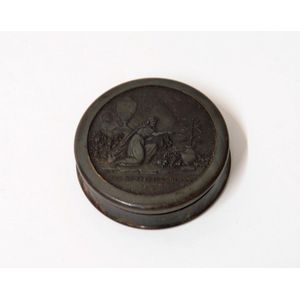Bantam Sultan's Ambassadors' Wax Seal and Case
You must be a subscriber, and be logged in to view price and dealer details.
Subscribe Now to view actual auction price for this item
When you subscribe, you have the option of setting the currency in which to display prices to $Au, $US, $NZ or Stg.
- East India Company - The British East India Company was a British trading company that was active from 1600 to 1858. It was one of the leading commercial enterprises of its time and played a key role in the development of British trade and commerce with India, China, and Southeast Asia.
The British East India Company was granted a monopoly on trade with the East Indies by the English government, and it quickly established a network of trading posts and settlements throughout India and Southeast Asia. The company was involved in numerous wars and conflicts in India and Southeast Asia, and it gradually gained political influence over large parts of the region.In addition to its commercial activities, the British East India Company was also involved in the spread of British culture and influence in the regions it traded with. The company played a significant role in the introduction of British goods, ideas, and institutions in India and Southeast Asia, and it was instrumental in the establishment of the British Empire in India.The British East India Company was dissolved in 1858, following the Indian Rebellion of 1857.
The Dutch East India Company, also known as the Vereenigde Oost-Indische Compagnie (VOC), was a Dutch trading company that was active from 1602 to 1798. It was one of the first multinational corporations in the world and one of the largest commercial enterprises in history.
The Dutch East India Company was established with the goal of establishing a trade monopoly in the spice trade with the East Indies. The company was granted a 21-year monopoly on the Dutch spice trade, and it quickly became one of the most successful and powerful trading companies in the world.
Over the course of the 17th and 18th centuries, the Dutch East India Company expanded its reach and influence throughout Southeast Asia, the Indian subcontinent, and the Far East. The company established a network of trading posts and colonies, and it played a major role in the commercial and political development of many regions in Asia.
Despite its commercial success, the Dutch East India Company was also notorious for its ruthless treatment of local populations and its exploitation of resources. The company was involved in numerous conflicts and wars throughout its history, and it was accused of using slave labor and engaging in acts of piracy.
The Dutch East India Company was dissolved in 1798. - Ebony - Ebony is a close grained timber, black in colour. It has a fine texture which can be polished to a high gloss, making it suitable for venereering, inlay and stringing and its use as solid timber is resticted to small decorative items and ornamental decoration, such as chess pieces and musical instrument parts. The term "ebonised" means "faux ebony", timber that has been darkened during the polishing process to resemble ebony.
This item has been included into following indexes:
Visually similar items

A Chinese Duan Inkstone, Republic Era, early to mid 20th century, a circular stone in black purple tones with a channel to the perimeter enclosed in a cushion shaped flat topped box with a patterned border in low relief and a central Chinese character mean

An early 19th century pressed horn circular lidded snuff box, the lid decorated in relief with a classical scene of a woman in a garden with an admirer behind a pedestal urn, entitled 'The Sensitive Plant'. The base with fine complicated floral motif and b

A chrome and brass rectangular occasional table by Romeo Rega, Italian circa 1970, signed

A Duke of Wellington commemorative souvenir, circa 1815, the brass embossed boxes contains paper discs pertaining to Wellington's historic battles. 5 cm wide
